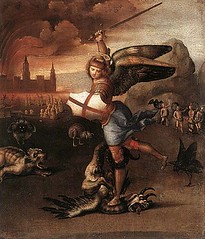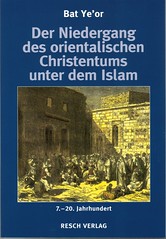By Soeren Kern
Europeans love to mock the salience of religion in American society, but they won’t be laughing for very long. The de-Christianization of Europe in the name of “tolerance” is rapidly driving the spiritually shiftless continent into the arms of Islam. And now, amidst the postmodern theological confusion that defines contemporary Europe, even Catholic clergy are jumping on the Islamomania bandwagon.
The latest post-Christian theological spectacle comes to us from the Netherlands (of Ayaan Hirsi Ali fame), where the Roman Catholic Bishop of Breda, Tiny Muskens, says he wants Christians to start calling God “Allah” because he believes such a gesture would promote “rapprochement between Christianity and Islam”. Appearing on Dutch television, the 71-year-old cleric said:
“Allah is a very beautiful word for God. Shouldn’t we all say that from now on we will name God Allah? … What does God care what we call him?”
Inquiring minds want to know: If the bishop really thinks the names “God” and “Allah” are interchangeable, why doesn’t he ask Muslims to start calling Allah “Yahweh”, the biblical name for God? But he won’t, because he knows they won’t.
Indeed, just because Christianity, Judaism and Islam are called “monotheistic” faiths, it does not follow that Christians, Jews and Muslims pray to the same God. So for those pre-postmoderns who believe that words still mean something, a quick survey of archaeology, history and theology - accompanied by a dose of common sense - can answer the question of whether the Allah of Islam is really the God of the Bible.
What Archaeology Says about Allah
Muslims claim that in pre-Islamic times, “Allah” was the biblical God of the Patriarchs, prophets and apostles. Indeed, the credibility of Islam as a religion stands or falls on its core claim of historical continuity with Judaism and Christianity. No wonder, then, that many Muslims get uppity when the claims of Islam are subjected to the hard science of archaeology.
Because archaeology provides irrefutable evidence that Allah, far from being the biblical God of Abraham, Isaac and Jacob, was actually the pre-Islamic pagan moon-god. Indeed, it is an established archaeological fact that worship of the moon-god was the main religion of the ancient Middle East.
But what about the Arabian Peninsula, where Mohammed (570-632) launched Islam? During the last two centuries, prominent archaeologists have unearthed thousands of inscriptions which prove beyond any doubt that the dominant religion of Arabia during Mohammed’s day was the cult of the moon-god.
In fact, for generations before Mohammed was born, the Arabs worshipped some 360 pagan gods housed at a stone temple in Mecca called the Kabah. According to archaeologists, the chief deity of Mecca was the moon-god called al-ilah (meaning the god or the idol), which was shortened to Allah in pre-Islamic times. Pagan Arabs even used Allah in the names they gave themselves: Mohammed’s father (Abdallah), for example, had Allah as part of his name.
What History Says about Allah
Historians say that pre-Islamic Arabs worshipped the moon-god by bowing in prayer toward Mecca several times a day. They would also make a pilgrimage to Mecca, run around the Kabah seven times and throw stones at the devil. And they fasted for one month, which began with the appearance of the crescent moon and ended when the crescent moon reappeared.
These same rites form the core of Islam today: Muslims bow in prayer toward Mecca; they make a pilgrimage to Mecca and run around the Kabah seven times; and they still throw stones at the devil. They also observe the fast of Ramadan, which begins and ends with the crescent moon.
Moreover, the ancient symbol of the pagan moon-god, the crescent moon, is the official symbol of Islam; it appears on the flags of Muslim countries, as well as on the tops of mosques and minarets everywhere.
Historians say that Mohammed, who as a traveling trader was exposed to Judaism and Christianity during his visits to different parts of the Middle East, tried to mimic those monotheistic faiths by taking Allah, the main deity within the Arabian pantheon, and making it the only god. Indeed, the basic confession of Islam is not that “Allah is Great” but that “Allah is Greater”. Greater than all the other idols, that is.
But Islam also draws from other pagan traditions. For example, the tale of Mohammed’s night journey into heaven parallels the Zoroastrian story of Arta Viraf. Zoroastrianism also inspired the Islamic belief that dark-eyed virgins await every man who enters heaven. And the Islamic ritual of praying five times a day? That, historians say, originates with the Sabeans, Syrian pagans who practiced an ecumenical mixture of Babylonian and Hellenic religion.
No surprise, then, that some scholars refer to Islam as monotheistic heathenism.
What Theology Says about Allah
Muslims claim that Islam is Judaism and Christianity reformed. They say the Koran confirms the truth of the Torah and the Gospels. But since those texts did not jibe with Mohammad’s beliefs, they accuse Jews and Christians of changing and distorting the original versions. Muslims therefore assert that the Koran “clarifies” the Bible.
Even if that were the case, the Koran and the Bible present ideas about God (especially about His character) that are so diametrically opposed that any reasonable observer would conclude that each book refers to a distinct deity.
The Koran, for example, states unequivocally that Allah is an unknowable and non-personal deity. By contrast, the God of the Bible allows Himself to be known and desires fellowship with human beings on a personal basis. Indeed, the Bible says that Abraham (the same Abraham whom Muslims say they venerate) was the “friend of God.”
The Koran also portrays Allah as a vindictive deity who hates sinners and desires to afflict them. But the Bible says God is love.
Moreover, the New Testament teaches that God loved humanity so much that He came to earth to pay the debt for man’s sin, and that that act of grace is available for free to anyone who believes Jesus Christ is their personal Savior. But Islam denies that Christ was God or that He died in order to save humanity. Indeed, Allah does not provide any way for man to be reconciled to God.
And the theological differences go on and on, so much so that the God of the Bible cannot possibly be the Allah worshipped in Islam. Unless, of course, a Dutch bishop says so.
Allah and Eurabia
Mohammed thought the Jews and Christians of his day would receive him as a prophet. But the Bible says that any new revelation must agree with what is already established in Scripture (Isaiah 8:20). So they rejected his Allah as a false god. And Mohammed replied by setting his Islam on a permanent warpath against Judaism and Christianity that continues to this day.
The Dutch bishop and other Muslim fellow travelers think they can buy a fake peace with Islam by playing relativistic word games as a part of an “inter-faith” dialogue. But Muslims understand much better than do post-modern Europeans that ecumenical appeasement is a symptom of a Judeo-Christian civilization that is weak and dying.
The irony is that the real danger from Islam stems not so much from ordinary Muslims as it does from sickly Europeans who have subverted their Judeo-Christian heritage in search of secular hedonism. Because they live only for the moment, they are willing submit to anything, including Islam, as long as it doesn’t interfere with the pursuit of pleasure today.
It has been more than 50 years since the late Christian apologist C.S. Lewis first warned about Western Civilization’s disastrous lurch into post-Christianity. But even he would be surprised to see how quickly Islam is filling the religious and cultural vacuum that is post-Christian Europe.
It’s not that Europeans haven’t been forewarned. It’s that they couldn’t care less.
Soeren Kern is Senior Analyst for Transatlantic Relations at the Madrid-based Grupo de Estudios Estratégicos / Strategic Studies Group.
Monday, August 27, 2007
Who is Allah? - What Archaeology, History, Theology Says about Allah
Subscribe to:
Post Comments (Atom)




No comments:
Post a Comment